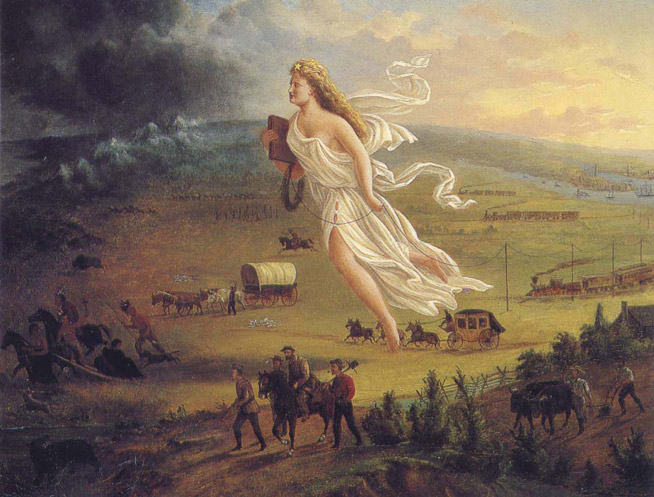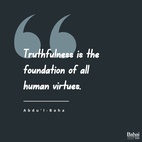The views expressed in our content reflect individual perspectives and do not represent the official views of the Baha'i Faith.
The idea of triumphalism – that any particular religion will one day prevail, dispatch the “heretics” and conquer the world – has plagued humanity for centuries. In his book When Religion Becomes Evil, Dr. Charles Kimball explores the concept of triumphalism, in which some faith groups see the ideal time for their certain triumph as inevitable and desirable:
Some religious communities place a great deal of emphasis on a this-worldly hope…. When the hoped-for ideal is tied to a particular religious worldview and those who wish to implement their vision become convinced that they know what God wants for them and everyone else, you have a prescription for disaster. – p. 105.
Wikipedia defines it this way: Triumphalism is the attitude or belief that a particular doctrine, religion, culture, or social system is superior to and should triumph over all others.
This concept of inherent superiority has several negative consequences, especially when religious belief becomes triumphalist. It creates an in-group and an out-group, often judging those in the out-group as “evil”. It makes it very difficult for people who belong to the in-group to objectively view the overall morality or value of the group’s actions. It stifles innovation and change within the in-group. It produces a sense of isolation and distance from others. And it generates a will to conquer and dominate others by imposing the in-group’s ideology and belief systems on them.
Triumphalism, then, is nothing more than a severe prejudice — the mistaken notion that my belief is somehow more substantial, correct and Godly than your belief.
In human history, we have lots of examples of the extreme prejudice that leads to triumphalism. The two hundred years of the Crusades, meant to impose the will of the ruling Catholic Church on Muslim populations; the Islamic conquests that preceded the Crusades; the centuries-long, church-supported and church-backed campaign of European colonialism into Africa, Asia and the Americas; and the ugly westward march of American manifest destiny that expanded the United States at the expense of native peoples and slaves. In today’s world, triumphalist groups and sects exist under the name of many major Faiths.
For example — the great, overwhelming majority of Muslims in the world today reject the triumphalist claims of the Taliban – but the power of that group still determines the boundaries of life for girls like Malala Yousafzai in rural Afghanistan.
In When Religion Becomes Evil, Dr. Kimball warns us about this kind of religious triumphalism:
Those who narrowly define ideal temporal structures of the state and determine that they are God’s agents to establish a theocracy are dangerous. Religion is easily corrupted in this context. Beware of people and groups whose political blueprint is based on a mandate from heaven that depends on human beings to implement. – p. 125.
We will only eradicate the extreme prejudice of religious triumphalism, according to the Baha’i teachings, when human society begins to look objectively and openly into the reality of faith:
I ask you, is not fellowship and brotherhood preferable to enmity and hatred in society and community? The answer is self-evident. Love and fellowship are absolutely needful to win the good-pleasure of God which is the goal of all human attainment. We must be united. We must love each other. We must ever praise each other. We must bestow commendation upon all people, thus removing the discord and hatred which have caused alienation amongst men. Otherwise the conditions of the past will continue, praising ourselves and condemning others; religious wars will have no end and religious prejudice, the prime cause of this havoc and tribulation, will increase. This must be abandoned, and the way to do it is to investigate the reality which underlies all the religions. This underlying reality is the love of humanity. For God is one and humanity is one, and the only creed of the prophets is love and unity. – Abdu’l-Baha, Foundations of World Unity, p. 99.
The Baha’i writings call for a clear and explicit differentiation of the spheres of politics and religion, so that no sense of religious triumphalism can insert itself into the Baha’i Faith. Baha’is do not involve themselves in partisan politics, and they do not interfere with the actions of just governments. In fact, Baha’is believe strongly that religion and politics have entirely different goals:
Religion concerns matters of the heart, of the spirit, and of morals. Politics are occupied with the material things of life. Religious teachers should not invade the realm of politics; they should concern themselves with the spiritual education of the people; they should ever give good counsel to men, trying to serve God and humankind; they should endeavor to awaken spiritual aspiration, and strive to enlarge the understanding and knowledge of humanity, to improve morals, and to increase the love for justice. – Abdu’l-Baha, Paris Talks, p. 158.


















Comments
Sign in or create an account
Continue with Facebookor